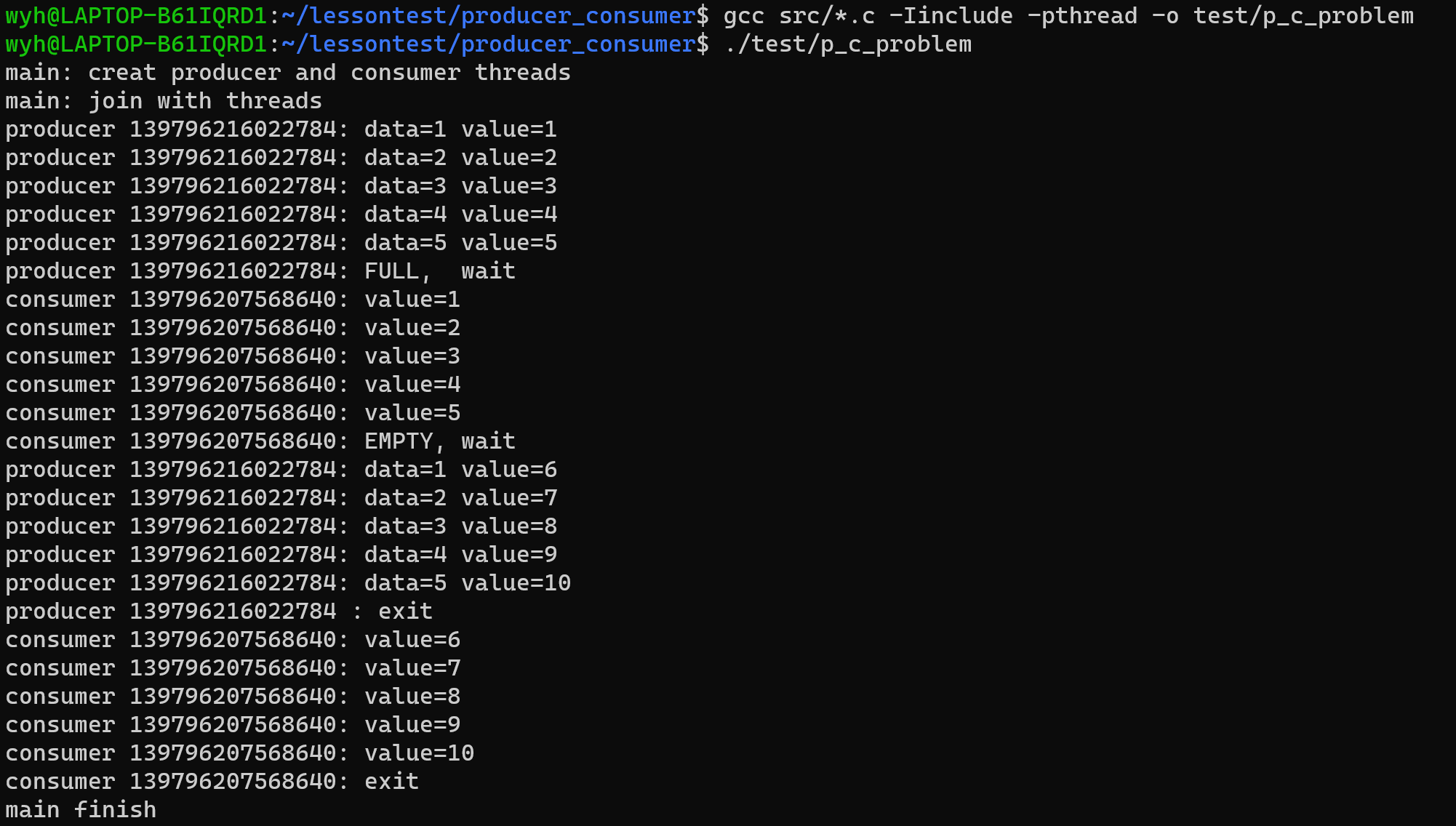20191323王予涵第四章学习笔记
20191323王予涵第四章学习笔记
一、知识点总结
线程
优点:
- 创建切换速度快
- 相应速度快
- 适合并行计算
缺点:
- 需要来自用户的明确同步
- 库函数对线程不安全
- 在单处理机OS上使用线程解决比使用顺序慢
线程操作
管理函数:
include <Pthread.h>
pthread_create(thread, attr, function, arg) :创建线程
pthread_exit(status):终止线程
pthread_cancel(thread):取消线程
pthread_attr_init(attr):初始化线程属性
pthread_attr_destory(attr):释放attr资源
pthread_equal(pthread_t t1, pthread_t t2):比较线程
操作步骤:
创建
比较
终止
连接
线程同步
互斥量:
- 静态方法初始化互斥量:
pthread_mutex_t m = PTHREAD_MUTEX_INITIALIZER - 动态方法初始化互斥量:
pthread_mutex_init (pthread_mutex_t *m, pthread_mutexattr_t, *attr)
int pthread_mutex_lock (pthread_mutex_t *m):封锁互斥量
int pthread_mutex_unlock(pthread_mutex_t *m):解锁互斥量
int pthread_mutex_trylock(pthread_mutex_t *m):尝试封锁互斥量,若互斥量已被封锁则返回错误,该函数旨在预防死锁
int pthread_mutex_destory(pthread_mutex_t *m):关闭互斥量
封锁的互斥量只能由上锁者解锁
条件变量:
- 静态方法初始化条件变量:
pthread_cond_t m = PTHREAD_COND_INITIALIZER - 动态方法初始化条件变量
信号量:
数据结构:
struct semphore{
int value;
struct process *queue;
}
P(wait)原语和V(signal)原语:
P(struct semphore *s){
s -> value--;
if(s->value < 0)
BLOCK(S);
}
V(struct semphore *s){
s -> value++;
if(s->value <= 0)
SIGNAL(S);
}
value值为1的信号量退化为互斥量,可以用来实现前趋关系
二、实践利用条件变量实现生产-消费问题
“head.h
#ifndef HEAD_H_INCLUDED
#define HEAD_H_INCLUDED
#include <stdio.h>
#include <stdlib.h>
#include <pthread.h>
#define NBUF 5
#define N 10
void *consumer();
void *producer();
int init();
int buf[NBUF];
int head, tail;
int data;
pthread_mutex_t mutex;
pthread_cond_t empty, full;
#endif // HEAD_H_INCLUDED
main.c
#include "head.h"
int main()
{
pthread_t pro, con;
init();
printf("main: creat producer and consumer threads\n");
pthread_create(&pro, NULL, producer, NULL);
pthread_create(&con, NULL, consumer, NULL);
printf("main: join with threads\n");
pthread_join(pro, NULL);
pthread_join(con, NULL);
printf("main finish\n");
}
init.c
#include "head.h"
int init()
{
head = tail = data = 0;
pthread_mutex_init(&mutex, NULL);
pthread_cond_init(&full, NULL);
pthread_cond_init(&empty, NULL);
}
"producer.c"
#include "head.h"
void *producer()
{
int i;
pthread_t me = pthread_self();
for(i = 0; i < N; i++)
{
pthread_mutex_lock(&mutex);
if(data == NBUF)
{
printf("producer %lu: FULL, wait\n", me);
pthread_cond_wait(&empty, &mutex);
}
buf[head++] = i + 1;
head %= NBUF;
data++;
printf("producer %lu: data=%d value=%d\n", me,data, i+1);
pthread_mutex_unlock(&mutex);
pthread_cond_signal(&full);
}
printf("producer %lu : exit\n", me);
}
"consumer.c"
#include "head.h"
void *consumer()
{
int i, c;
pthread_t me = pthread_self();
for(i = 0; i < N; i++)
{
pthread_mutex_lock(&mutex);
if(data == 0)
{
printf("consumer %lu: EMPTY, wait\n", me);
pthread_cond_wait(&full, &mutex);
}
c = buf[tail++];
tail %= NBUF;
data--;
printf("consumer %lu: value=%d\n", me ,c);
pthread_mutex_unlock(&mutex);
pthread_cond_signal(&empty);
}
printf("consumer %lu: exit\n", me);
}




